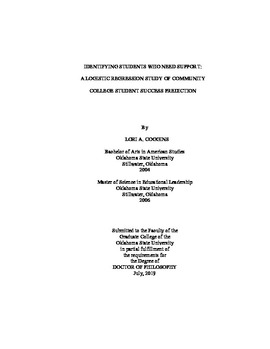| dc.contributor.advisor | Kearney, Kerri S. | |
| dc.contributor.author | Coggins, Lori A. | |
| dc.date.accessioned | 2020-01-30T15:03:03Z | |
| dc.date.available | 2020-01-30T15:03:03Z | |
| dc.date.issued | 2019-07 | |
| dc.identifier.uri | https://hdl.handle.net/11244/323339 | |
| dc.description.abstract | Ongoing questions exist about whether placement measures used by community colleges accurately predict students' potential for success in addition to assessing their academic achievement levels in reading, writing, and math. Research has shown that noncognitive measures can be effective tools for predicting student success and that success prediction has shown promise in improving the English and mathematics course placement process for community college students. More accurate placement can provide shorter time to degree and lower likelihood of dropping out. Subsequently, some community colleges have begun to implement success prediction as part of their placement processes to determine not only students' levels of academic preparation, but also their likelihood of succeeding in courses and staying in college. The purpose of this study was to evaluate the effectiveness, based on student performance and retention, of using a noncognitive assessment score to predict student success in English and math courses and retention from fall to spring semesters at a multi-campus, urban community college. Logistic regression was employed to determine the predictive value of SuccessNavigator, a noncognitive assessment, and that of other student information such as high school GPA, ACT scores, and writing and math placement tests. Data analysis demonstrated that although SuccessNavigator was a statistically significant predictor of student success and retention, a combination of high school GPA and ACT subject-area scores most accurately predicted success in writing and math courses, and that high school GPA was the best predictor of retention from fall 2016 to spring 2017. Findings from this study imply that more research is needed that applies new success theories that are specific to community college students to determine the best ways for community colleges to predict success and properly place their students. | |
| dc.format | application/pdf | |
| dc.language | en_US | |
| dc.rights | Copyright is held by the author who has granted the Oklahoma State University Library the non-exclusive right to share this material in its institutional repository. Contact Digital Library Services at lib-dls@okstate.edu or 405-744-9161 for the permission policy on the use, reproduction or distribution of this material. | |
| dc.title | Identifying Students Who Need Support: A Logistic Regression Study of Community College Student Success Prediction | |
| dc.contributor.committeeMember | Wanger, Stephen P. | |
| dc.contributor.committeeMember | Foubert, John D. | |
| dc.contributor.committeeMember | Fry, Pamela M. | |
| osu.filename | Coggins_okstate_0664D_16366.pdf | |
| osu.accesstype | Open Access | |
| dc.type.genre | Dissertation | |
| dc.type.material | Text | |
| dc.subject.keywords | community college | |
| dc.subject.keywords | logistic regression | |
| dc.subject.keywords | noncognitive assessment | |
| dc.subject.keywords | placement | |
| dc.subject.keywords | success prediction | |
| thesis.degree.discipline | Educational Leadership and Policy Studies | |
| thesis.degree.grantor | Oklahoma State University | |
